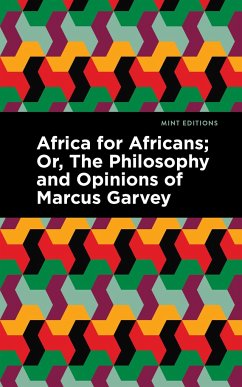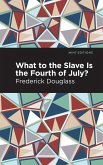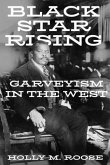Marcus Garvey, Marcus Garvey, Amy Jacques Garvey
Africa for Africans
Or, the Philosophy and Opinions of Marcus Garvey
19,99 €
inkl. MwSt.
Versandfertig in über 4 Wochen

10 °P sammeln
Marcus Garvey, Marcus Garvey, Amy Jacques Garvey
Africa for Africans
Or, the Philosophy and Opinions of Marcus Garvey
- Broschiertes Buch
- Merkliste
- Auf die Merkliste
- Bewerten Bewerten
- Teilen
- Produkt teilen
- Produkterinnerung
- Produkterinnerung
Following the imprisonment of her husband in 1922, Amy Jacques Garvey set forth to preserve the dream of Black Nationalism and African independence. Collecting the letters, speeches and essays of Marcus Garvey, she produced the complete philosophies of one of the most controversial yet influential figures in 20th century Black America.
Andere Kunden interessierten sich auch für
![Gray Areas Gray Areas]() Adia Harvey WingfieldGray Areas25,99 €
Adia Harvey WingfieldGray Areas25,99 €![Black AF History Black AF History]() Michael HarriotBlack AF History20,99 €
Michael HarriotBlack AF History20,99 €![What to the Slave is the Fourth of July? What to the Slave is the Fourth of July?]() Frederick DouglassWhat to the Slave is the Fourth of July?8,99 €
Frederick DouglassWhat to the Slave is the Fourth of July?8,99 €![Fighting for Honor Fighting for Honor]() T. J. Desch-ObiFighting for Honor35,99 €
T. J. Desch-ObiFighting for Honor35,99 €![Four Hundred Souls: A Community History of African America, 1619-2019 Four Hundred Souls: A Community History of African America, 1619-2019]() Ibram X. KendiFour Hundred Souls: A Community History of African America, 1619-201917,99 €
Ibram X. KendiFour Hundred Souls: A Community History of African America, 1619-201917,99 €![Black Star Rising Black Star Rising]() Holly M. RooseBlack Star Rising44,99 €
Holly M. RooseBlack Star Rising44,99 €![Tip of the Spear Tip of the Spear]() Orisanmi BurtonTip of the Spear31,99 €
Orisanmi BurtonTip of the Spear31,99 €-
-
-
Following the imprisonment of her husband in 1922, Amy Jacques Garvey set forth to preserve the dream of Black Nationalism and African independence. Collecting the letters, speeches and essays of Marcus Garvey, she produced the complete philosophies of one of the most controversial yet influential figures in 20th century Black America.
Produktdetails
- Produktdetails
- Mint Editions
- Verlag: Graphic Arts Books
- Seitenzahl: 560
- Erscheinungstermin: 16. August 2022
- Englisch
- Abmessung: 200mm x 125mm x 30mm
- Gewicht: 608g
- ISBN-13: 9781513203591
- ISBN-10: 1513203592
- Artikelnr.: 63365498
- Mint Editions
- Verlag: Graphic Arts Books
- Seitenzahl: 560
- Erscheinungstermin: 16. August 2022
- Englisch
- Abmessung: 200mm x 125mm x 30mm
- Gewicht: 608g
- ISBN-13: 9781513203591
- ISBN-10: 1513203592
- Artikelnr.: 63365498
Marcus Garvey (1887 – 1940) was a controversial yet influential political activist, entrepreneur and journalist. Born in Saint Ann’s Bay, Jamaica, Garvey experienced first hand the ills of colonialism, colorism and racism during his upbringing, ultimately shaping his view of the world. His early adult years were spent learning trades and involving himself in political organizations such as The National Club and going onto create the United Negro Improvement Association and the African Communities League in 1914. Three years after this, he would go onto the United States, with the hopes of further expanding the U.N.I.A and spreading his message of Black brotherhood in an “Africa for Africans,” spilling into the creation of a weekly newspaper, The Negro World in 1918. As Garveyism began to take hold in Black communities in the United States and abroad, Garvey faced increased government surveillance and strife as he attempted to branch out into other ventures like The Black Star Line. Between 1922 – 1925, Garvey was arrested and tried on accusations of mail fraud before his eventual deportation from the United States in 1927. Never one to become settled, Garvey lived out the rest of his life attempting to travel the world and continue to spread his ideology; while often clashing with other Black leaders and organizations of the time. A very complicated and complex figure, Garvey was nevertheless an important piece to the foundation of Black nationalism as it is known today.
A Word on The Philosophies of Marcus Garvey
VOLUME I
Preface
Part I
Epigrams
Part II
Propaganda
Slavery
Force
Education
Miscegenation
Prejudice
Radicalism
Government
Evolution & the Result
Poverty
Power
Universal Suspicion
Dissertation on Man
Race Assimilation
Christianity
The Function of Man
Traitors
Part III
Present Day Civilization
Divine Apportionment of Earth
Universal Unrest in 1922
World Disarmament
Cause of Wars
World Readjustment
The Fall of Governments
Great Ideals Know No Nationality
Purpose of Creation
Purity of Race
Man know Thyself
A Solution for World Peace in 1922
God as a War Lord
The Image of God
Part IV
The Slave Trade
Negroes’ Status Under Alien Governments
The Negro as an Industrial Makeshift
Lack of Cooperation in the Negro Race
White man’s Solution for the Negro Problem in America
The True Solution of the Negro Problem
White Propaganda about Africa
The Three Stages of the Negro in Contact with the White Man
Booker T. Washington’s Program
Belief that Race Problem will Adjust Itself a Fallacy
Examples of white Christian Control of Africa
The Thought behind their deeds
Similarity of Persecution
Shall the Negro be exterminated?
Africa for the Africans
The Future As I see it
Part V
Emancipation Speech
Christmas Message
Easter Sermon
Convention Speech
Statement on arrest
VOLUME II
Preface
Part I: An Appeal to White America
An Appeal to White America
Racial Reforms and Reformers
The Crime of Injustice
World Materialism
Who and What Is a Negro
An Appeal to the Conscience of the Black Race
Christ, the First Great Reformer
The Negro’s Place in World Reorganization
Aims and Objects of Movement, etc.
Will Negroes Succumb to the White Man’s Plan, etc.
An Analysis of Warren G. Harding
An Expose of the Caste System Among Negroes
Africa’s Wealth
The Negro, Communism and His Friend
Capitalism and the State
Governing the Ideal State
The “Colored” of Negro Press
What We Believe
History of the Negro
The Internal Prejudices of Negroes
A Tribute to the Late Sir Isaiah Morter
A Speech on the Principles of U.N.I.A
A Speech Delivered at Carnegie Hall
A Speech on Disarmament Conference, Telegram Sent and Reply
A Speech Delivered at Madison Square Garden
The Negroes Greatest Enemy
Declaration of Rights of the Negroes of the World
Part II: United States of America vs. Marcus Garvey
Was Justice Defeated?
Brief for Plaintiff-in-Error
Testimony of Mailing Clerk
Decision of Circuit Court of Appeals
Stripping the Effect to Show Crime
Last Speech Before Incarceration in Tombs Prison
Address to Jury at Close of Trial
Statement to the Press on Release From the Tombs Prison
First Speech After Release From the Tombs Prison
First Message From Atlanta Prison
Using the Government, etc., to Defeat Justice
Application for Pardon and Reply
A Strange Comparison
Salaries to Officers of U.N.I.A & Oaths They Took
A Race That Steals From and Double Crosses Itself
Eight Negroes vs. Marcus Garvey
W.E.B. Dubois—A Hater of Dark People
Why I Have Not Spoken in Chicago
A Message From Atlanta, August, 1925
Statement of Conviction
How Alleged Crimes Are Disposed Of
The Ideal of Two Races
An Answer to the Appeal (Speech by Mr. John Powell)
Part III
The Plot
Scene Africa
Scene Liberia, W. Africa, etc.
Letter From Com. Garcia to Pres. King and Reply
Liberian Committees, Suggestions, etc.
Petition to Liberian Senate
Robbing the Negro’s Values
Scene Aboard Ship “Paris”
Eli Garcia’s Confidential Report
Scene League of Nations
Scene Harlem
The Betrayal of a Struggling Race
VOLUME I
Preface
Part I
Epigrams
Part II
Propaganda
Slavery
Force
Education
Miscegenation
Prejudice
Radicalism
Government
Evolution & the Result
Poverty
Power
Universal Suspicion
Dissertation on Man
Race Assimilation
Christianity
The Function of Man
Traitors
Part III
Present Day Civilization
Divine Apportionment of Earth
Universal Unrest in 1922
World Disarmament
Cause of Wars
World Readjustment
The Fall of Governments
Great Ideals Know No Nationality
Purpose of Creation
Purity of Race
Man know Thyself
A Solution for World Peace in 1922
God as a War Lord
The Image of God
Part IV
The Slave Trade
Negroes’ Status Under Alien Governments
The Negro as an Industrial Makeshift
Lack of Cooperation in the Negro Race
White man’s Solution for the Negro Problem in America
The True Solution of the Negro Problem
White Propaganda about Africa
The Three Stages of the Negro in Contact with the White Man
Booker T. Washington’s Program
Belief that Race Problem will Adjust Itself a Fallacy
Examples of white Christian Control of Africa
The Thought behind their deeds
Similarity of Persecution
Shall the Negro be exterminated?
Africa for the Africans
The Future As I see it
Part V
Emancipation Speech
Christmas Message
Easter Sermon
Convention Speech
Statement on arrest
VOLUME II
Preface
Part I: An Appeal to White America
An Appeal to White America
Racial Reforms and Reformers
The Crime of Injustice
World Materialism
Who and What Is a Negro
An Appeal to the Conscience of the Black Race
Christ, the First Great Reformer
The Negro’s Place in World Reorganization
Aims and Objects of Movement, etc.
Will Negroes Succumb to the White Man’s Plan, etc.
An Analysis of Warren G. Harding
An Expose of the Caste System Among Negroes
Africa’s Wealth
The Negro, Communism and His Friend
Capitalism and the State
Governing the Ideal State
The “Colored” of Negro Press
What We Believe
History of the Negro
The Internal Prejudices of Negroes
A Tribute to the Late Sir Isaiah Morter
A Speech on the Principles of U.N.I.A
A Speech Delivered at Carnegie Hall
A Speech on Disarmament Conference, Telegram Sent and Reply
A Speech Delivered at Madison Square Garden
The Negroes Greatest Enemy
Declaration of Rights of the Negroes of the World
Part II: United States of America vs. Marcus Garvey
Was Justice Defeated?
Brief for Plaintiff-in-Error
Testimony of Mailing Clerk
Decision of Circuit Court of Appeals
Stripping the Effect to Show Crime
Last Speech Before Incarceration in Tombs Prison
Address to Jury at Close of Trial
Statement to the Press on Release From the Tombs Prison
First Speech After Release From the Tombs Prison
First Message From Atlanta Prison
Using the Government, etc., to Defeat Justice
Application for Pardon and Reply
A Strange Comparison
Salaries to Officers of U.N.I.A & Oaths They Took
A Race That Steals From and Double Crosses Itself
Eight Negroes vs. Marcus Garvey
W.E.B. Dubois—A Hater of Dark People
Why I Have Not Spoken in Chicago
A Message From Atlanta, August, 1925
Statement of Conviction
How Alleged Crimes Are Disposed Of
The Ideal of Two Races
An Answer to the Appeal (Speech by Mr. John Powell)
Part III
The Plot
Scene Africa
Scene Liberia, W. Africa, etc.
Letter From Com. Garcia to Pres. King and Reply
Liberian Committees, Suggestions, etc.
Petition to Liberian Senate
Robbing the Negro’s Values
Scene Aboard Ship “Paris”
Eli Garcia’s Confidential Report
Scene League of Nations
Scene Harlem
The Betrayal of a Struggling Race
A Word on The Philosophies of Marcus Garvey
VOLUME I
Preface
Part I
Epigrams
Part II
Propaganda
Slavery
Force
Education
Miscegenation
Prejudice
Radicalism
Government
Evolution & the Result
Poverty
Power
Universal Suspicion
Dissertation on Man
Race Assimilation
Christianity
The Function of Man
Traitors
Part III
Present Day Civilization
Divine Apportionment of Earth
Universal Unrest in 1922
World Disarmament
Cause of Wars
World Readjustment
The Fall of Governments
Great Ideals Know No Nationality
Purpose of Creation
Purity of Race
Man know Thyself
A Solution for World Peace in 1922
God as a War Lord
The Image of God
Part IV
The Slave Trade
Negroes’ Status Under Alien Governments
The Negro as an Industrial Makeshift
Lack of Cooperation in the Negro Race
White man’s Solution for the Negro Problem in America
The True Solution of the Negro Problem
White Propaganda about Africa
The Three Stages of the Negro in Contact with the White Man
Booker T. Washington’s Program
Belief that Race Problem will Adjust Itself a Fallacy
Examples of white Christian Control of Africa
The Thought behind their deeds
Similarity of Persecution
Shall the Negro be exterminated?
Africa for the Africans
The Future As I see it
Part V
Emancipation Speech
Christmas Message
Easter Sermon
Convention Speech
Statement on arrest
VOLUME II
Preface
Part I: An Appeal to White America
An Appeal to White America
Racial Reforms and Reformers
The Crime of Injustice
World Materialism
Who and What Is a Negro
An Appeal to the Conscience of the Black Race
Christ, the First Great Reformer
The Negro’s Place in World Reorganization
Aims and Objects of Movement, etc.
Will Negroes Succumb to the White Man’s Plan, etc.
An Analysis of Warren G. Harding
An Expose of the Caste System Among Negroes
Africa’s Wealth
The Negro, Communism and His Friend
Capitalism and the State
Governing the Ideal State
The “Colored” of Negro Press
What We Believe
History of the Negro
The Internal Prejudices of Negroes
A Tribute to the Late Sir Isaiah Morter
A Speech on the Principles of U.N.I.A
A Speech Delivered at Carnegie Hall
A Speech on Disarmament Conference, Telegram Sent and Reply
A Speech Delivered at Madison Square Garden
The Negroes Greatest Enemy
Declaration of Rights of the Negroes of the World
Part II: United States of America vs. Marcus Garvey
Was Justice Defeated?
Brief for Plaintiff-in-Error
Testimony of Mailing Clerk
Decision of Circuit Court of Appeals
Stripping the Effect to Show Crime
Last Speech Before Incarceration in Tombs Prison
Address to Jury at Close of Trial
Statement to the Press on Release From the Tombs Prison
First Speech After Release From the Tombs Prison
First Message From Atlanta Prison
Using the Government, etc., to Defeat Justice
Application for Pardon and Reply
A Strange Comparison
Salaries to Officers of U.N.I.A & Oaths They Took
A Race That Steals From and Double Crosses Itself
Eight Negroes vs. Marcus Garvey
W.E.B. Dubois—A Hater of Dark People
Why I Have Not Spoken in Chicago
A Message From Atlanta, August, 1925
Statement of Conviction
How Alleged Crimes Are Disposed Of
The Ideal of Two Races
An Answer to the Appeal (Speech by Mr. John Powell)
Part III
The Plot
Scene Africa
Scene Liberia, W. Africa, etc.
Letter From Com. Garcia to Pres. King and Reply
Liberian Committees, Suggestions, etc.
Petition to Liberian Senate
Robbing the Negro’s Values
Scene Aboard Ship “Paris”
Eli Garcia’s Confidential Report
Scene League of Nations
Scene Harlem
The Betrayal of a Struggling Race
VOLUME I
Preface
Part I
Epigrams
Part II
Propaganda
Slavery
Force
Education
Miscegenation
Prejudice
Radicalism
Government
Evolution & the Result
Poverty
Power
Universal Suspicion
Dissertation on Man
Race Assimilation
Christianity
The Function of Man
Traitors
Part III
Present Day Civilization
Divine Apportionment of Earth
Universal Unrest in 1922
World Disarmament
Cause of Wars
World Readjustment
The Fall of Governments
Great Ideals Know No Nationality
Purpose of Creation
Purity of Race
Man know Thyself
A Solution for World Peace in 1922
God as a War Lord
The Image of God
Part IV
The Slave Trade
Negroes’ Status Under Alien Governments
The Negro as an Industrial Makeshift
Lack of Cooperation in the Negro Race
White man’s Solution for the Negro Problem in America
The True Solution of the Negro Problem
White Propaganda about Africa
The Three Stages of the Negro in Contact with the White Man
Booker T. Washington’s Program
Belief that Race Problem will Adjust Itself a Fallacy
Examples of white Christian Control of Africa
The Thought behind their deeds
Similarity of Persecution
Shall the Negro be exterminated?
Africa for the Africans
The Future As I see it
Part V
Emancipation Speech
Christmas Message
Easter Sermon
Convention Speech
Statement on arrest
VOLUME II
Preface
Part I: An Appeal to White America
An Appeal to White America
Racial Reforms and Reformers
The Crime of Injustice
World Materialism
Who and What Is a Negro
An Appeal to the Conscience of the Black Race
Christ, the First Great Reformer
The Negro’s Place in World Reorganization
Aims and Objects of Movement, etc.
Will Negroes Succumb to the White Man’s Plan, etc.
An Analysis of Warren G. Harding
An Expose of the Caste System Among Negroes
Africa’s Wealth
The Negro, Communism and His Friend
Capitalism and the State
Governing the Ideal State
The “Colored” of Negro Press
What We Believe
History of the Negro
The Internal Prejudices of Negroes
A Tribute to the Late Sir Isaiah Morter
A Speech on the Principles of U.N.I.A
A Speech Delivered at Carnegie Hall
A Speech on Disarmament Conference, Telegram Sent and Reply
A Speech Delivered at Madison Square Garden
The Negroes Greatest Enemy
Declaration of Rights of the Negroes of the World
Part II: United States of America vs. Marcus Garvey
Was Justice Defeated?
Brief for Plaintiff-in-Error
Testimony of Mailing Clerk
Decision of Circuit Court of Appeals
Stripping the Effect to Show Crime
Last Speech Before Incarceration in Tombs Prison
Address to Jury at Close of Trial
Statement to the Press on Release From the Tombs Prison
First Speech After Release From the Tombs Prison
First Message From Atlanta Prison
Using the Government, etc., to Defeat Justice
Application for Pardon and Reply
A Strange Comparison
Salaries to Officers of U.N.I.A & Oaths They Took
A Race That Steals From and Double Crosses Itself
Eight Negroes vs. Marcus Garvey
W.E.B. Dubois—A Hater of Dark People
Why I Have Not Spoken in Chicago
A Message From Atlanta, August, 1925
Statement of Conviction
How Alleged Crimes Are Disposed Of
The Ideal of Two Races
An Answer to the Appeal (Speech by Mr. John Powell)
Part III
The Plot
Scene Africa
Scene Liberia, W. Africa, etc.
Letter From Com. Garcia to Pres. King and Reply
Liberian Committees, Suggestions, etc.
Petition to Liberian Senate
Robbing the Negro’s Values
Scene Aboard Ship “Paris”
Eli Garcia’s Confidential Report
Scene League of Nations
Scene Harlem
The Betrayal of a Struggling Race







